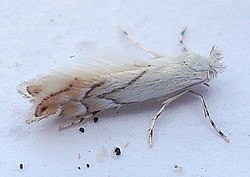| Phyllonorycter harrisella | |
|---|---|
 | |
 | |
| Scientific classification | |
| Kingdom: | Animalia |
| Phylum: | Arthropoda |
| Class: | Insecta |
| Order: | Lepidoptera |
| Family: | Gracillariidae |
| Genus: | Phyllonorycter |
| Species: | P. harrisella |
| Binomial name | |
| Phyllonorycter harrisella (Linnaeus, 1761) | |
| Synonyms | |
| |
Phyllonorycter harrisella is a moth of the family Gracillariidae. It is found in all of Europe, except the Balkan Peninsula and the Mediterranean islands.

The wingspan is 7–9 mm. The forewings are shining white; three posterior costal and two dorsal dark fuscous strigulae, anteriorly more or less margined suffusedly with brownish-ochreous, apex brownish-ochreous, enclosing a round black apical dot; an ill-defined dark hook in apical cilia. Hindwings are light grey. [1] [2] [3]
Adults are on wing in May and June and again in autumn.
The larvae feed on Quercus cerris , Quercus cerris austriaca, Quercus dalechampii , Quercus faginea , Quercus frainetto , Quercus macranthera , Quercus petraea , Quercus pontica , Quercus pubescens and Quercus robur . They mine the leaves of their host plant.